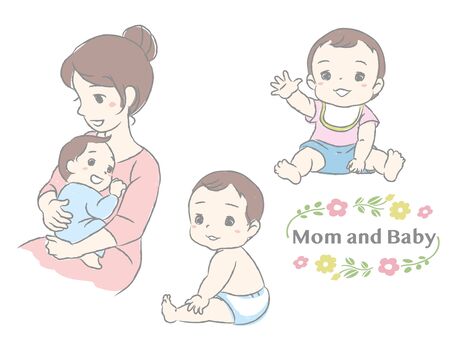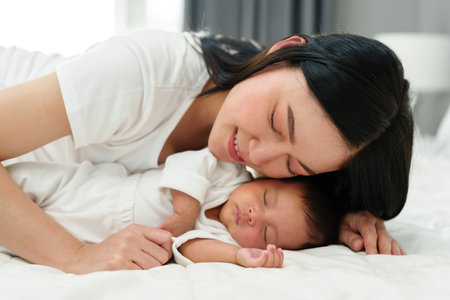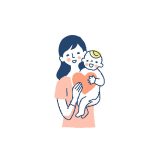1. Understanding Different Types of Baby Carriers
Choosing the right baby carrier starts with understanding the different types available. Each style offers unique benefits and is suited for various situations, comfort levels, and baby ages. Below, we explore four popular types of baby carriers to help you decide which one fits your lifestyle best.
Wraps
Wraps are long pieces of fabric that you tie around your body to create a snug, custom fit for your baby. They provide excellent support and distribute weight evenly across your shoulders and back. Wraps are ideal for newborns and infants who need close contact with their caregivers.
Pros:
- Offers a snug, womb-like environment for newborns
- Highly adjustable for different body types
- Even weight distribution reduces strain on the back
Cons:
- Learning to tie properly can take time
- Might feel too warm in hot weather
Slings
A sling is a single piece of fabric worn over one shoulder with a pouch or ring adjustment system. These are great for quick ups and downs, making them perfect for busy parents on the go.
Pros:
- Easy to put on and take off
- Perfect for breastfeeding while carrying
- Takes up little space when not in use
Cons:
- Puts more pressure on one shoulder
- Might not provide enough support for long wear periods
Soft-Structured Carriers (SSCs)
A soft-structured carrier (SSC) has padded straps, buckles, and a supportive waistband. It provides ergonomic support for both babies and parents, making it one of the most popular choices.
| Main Features | Suits Best For | |
|---|---|---|
| Pros: | Padded straps & waistbelt, easy to adjust, supports multiple carry positions | Toddlers & active parents needing hands-free convenience |
| Cons: | Buckles may take some time to adjust, bulkier than wraps or slings |
Hiking Backpacks
If youre an adventurous parent who loves the outdoors, a hiking backpack-style carrier is your best option. Designed with sturdy frames and extra padding, these carriers provide maximum comfort during long hikes.
Pros:
- Ideal for extended wear during outdoor activities
- Padded straps and hip belt reduce strain on the back
- Adds extra storage space for essentials like bottles and diapers
Cons:
- Larger and heavier than other carrier styles
- Suits older babies who can sit up independently (around 6 months+)
The best baby carrier depends on your lifestyle, daily activities, and comfort preferences. In the next section, well explore how to choose the right carrier based on different needs.
2. Key Factors to Consider When Choosing a Baby Carrier
Selecting the right baby carrier is all about finding the perfect balance between comfort, safety, and convenience. Below are the essential factors to keep in mind when making your decision.
Comfort for You and Your Baby
A comfortable baby carrier ensures both you and your little one enjoy every outing. Look for padded shoulder straps, lumbar support, and breathable fabrics that prevent overheating.
Safety Features
Safety should always be a top priority. Choose a carrier with strong buckles, sturdy stitching, and proper support for your babys head, neck, and hips. Ensure it meets safety standards like ASTM or JPMA certification.
Ease of Use
A baby carrier should be easy to put on and adjust without assistance. Some carriers have simple clip-in designs, while others require tying or wrapping. Consider how quickly you need to get your baby in and out.
Baby’s Age and Weight
Different carriers are designed for various stages of development. Check the manufacturer’s recommendations to ensure the carrier fits your baby’s age and weight range.
| Carrier Type | Recommended Age | Weight Range |
|---|---|---|
| Wraps | Newborn – 12 months | 7 – 25 lbs |
| Soft Structured Carriers (SSC) | Newborn – Toddler | 7 – 45 lbs |
| Meh Dai | Newborn – Toddler | 8 – 40 lbs |
| Backpack Carriers | 6 months – 4 years | 15 – 50 lbs |
Adjustability and Fit
A good baby carrier should adjust to fit different body types. Adjustable straps and waistbands allow multiple caregivers to use the same carrier comfortably.
Lifestyle Considerations
Your daily activities play a big role in choosing the best carrier. If youre frequently on the go, a lightweight, easy-to-pack option may be ideal. For hiking or long walks, opt for a backpack-style carrier with extra support.
Finding the Perfect Match for Your Needs
The best baby carrier is one that suits both your lifestyle and your babys needs. By prioritizing comfort, safety, ease of use, and adjustability, youll find a carrier that makes babywearing enjoyable for both of you.

3. Best Baby Carriers for Different Lifestyles
Choosing the right baby carrier depends on your lifestyle and daily activities. Whether youre an active parent, a frequent traveler, a city dweller, or someone who loves babywearing for long periods, theres a perfect carrier for you. Lets explore the best options based on different lifestyles.
Best Baby Carriers for Active Parents
If you love hiking, jogging, or simply staying active while carrying your little one, youll need a baby carrier that provides excellent support and comfort. Look for carriers with ergonomic designs, breathable fabric, and strong back support.
| Carrier Type | Key Features | Best For |
|---|---|---|
| Structured Backpack Carrier | Padded shoulder straps, lumbar support, storage compartments | Hiking and outdoor adventures |
| Soft-Structured Carrier (SSC) | Buckle system, breathable mesh fabric, ergonomic design | Active daily routines like walking or light exercise |
Best Baby Carriers for Travelers
If you travel frequently, youll want a lightweight and compact carrier thats easy to pack and comfortable for long hours of wear.
| Carrier Type | Key Features | Best For |
|---|---|---|
| Sling Carrier | Easily foldable, lightweight fabric, quick adjustments | Airport travel and short trips |
| Buckle Carrier with Mesh Fabric | Padded straps, breathable material, front and back carry options | Tropical destinations or warm climates |
| Pouch Carrier | No buckles or straps, simple slip-on design, ultra-lightweight | Simplified babywearing during flights or transit |
Best Baby Carriers for City Dwellers
Navigating busy streets and using public transportation requires a baby carrier that is convenient to put on and take off while offering hands-free mobility.
| Carrier Type | Key Features | Best For |
|---|---|---|
| Buckle Carrier with Front Carry Option | Easily adjustable straps, ergonomic design, good weight distribution | Crowded areas and commuting on public transport |
| Sling or Wrap Carrier | Sleek design, easy to store in a bag, stylish fabric choices | Coffee shop visits, errands, and short outings in the city |
| Crossover Hybrid Carrier | A mix of wrap and structured carrier benefits; easy to put on quickly | Moms and dads who want flexibility without bulkiness |
The Best Baby Carriers for Extended Babywearing
If you plan to wear your baby for extended periods—whether at home or on the go—youll need a carrier that evenly distributes weight to prevent strain on your back and shoulders.
| Carrier Type | Key Features | Best For |
|---|---|---|
| Ergonomic Soft-Structured Carrier (SSC) | Padded shoulder straps, lumbar support, multiple carry positions | Comfortable long-term wearing without discomfort |
| Woven Wrap | Adjustable fit for any body type, even weight distribution | Newborn to toddler stage; all-day babywearing at home or outside |
| Meh Dai (Asian-Style Carrier) | Tie straps for custom fit; supportive yet flexible | Parents who prefer traditional-style wraps with more structure |
No matter what your lifestyle is, theres a baby carrier designed to fit your needs. Finding the right one will make parenting easier while keeping your little one close and comfortable.
4. How to Ensure Comfort and Safety for You and Your Baby
Choosing the right baby carrier is just the first step—making sure you and your baby are comfortable and safe while using it is equally important. A well-fitted carrier can help prevent discomfort, support your babys development, and make carrying more enjoyable for both of you.
Proper Baby Positioning
Ensuring your baby is positioned correctly in the carrier is crucial for their safety and comfort. Follow these key guidelines:
- Keep the “M” position: Your baby’s knees should be higher than their bottom, forming an “M” shape. This supports healthy hip development.
- Maintain a close fit: Your baby should be snug against your chest, close enough that you can easily kiss the top of their head.
- Support the neck: For newborns and young infants, ensure their head and neck are properly supported by the carrier’s fabric or insert.
Ergonomic Support for Parents
A good baby carrier should also keep parents comfortable, especially if worn for long periods. Here are some ergonomic tips:
- Distribute weight evenly: Choose a carrier with padded shoulder straps and a wide waistband to help distribute your baby’s weight evenly across your back and shoulders.
- Avoid slouching: Keep your posture upright to prevent back strain. Adjust the straps so that your baby sits high on your torso.
- Select adjustable straps: A customizable fit helps prevent pressure points and ensures you stay comfortable as your baby grows.
Avoiding Common Mistakes
Mistakes in babywearing can lead to discomfort or even safety risks. Here’s what to watch out for:
| Mistake | Why It’s a Problem | How to Fix It |
|---|---|---|
| Baby’s chin tucked too tightly | This can restrict airflow and cause breathing difficulties. | Ensure there’s always space between the chin and chest (about two fingers’ width). |
| Poor weight distribution | Puts strain on your shoulders, back, or hips. | Adjust straps and waistbands so the weight is evenly spread. |
| Buckle or wrap too loose | Your baby might slump down, leading to poor positioning. | Tighten the carrier until they are snug against you without sagging. |
| Legs dangling straight down | This may put stress on the hips and joints. | Mimic a natural seated “M” position for proper hip support. |
T.I.C.K.S Rule for Babywearing Safety
The T.I.C.K.S rule is a helpful guide to ensure safe carrying:
- Tight: The carrier should be snug so your baby doesnt slump down.
- In view at all times: You should always be able to see your babys face without moving fabric aside.
- Close enough to kiss: Your babys head should be close enough for you to kiss easily.
- Keep chin off chest: Ensure theres space under their chin to allow for easy breathing.
- Supported back: Your babys back should be supported in a natural position without curving too much.
5. Top-Rated Baby Carriers and Parent Favorites
Choosing the right baby carrier can be overwhelming, but looking at top-rated options based on parent reviews, expert opinions, and real-life experiences can help simplify your decision. Below are some of the best baby carriers loved by parents for their comfort, durability, and ease of use.
Best Overall Baby Carriers
These carriers offer a great balance of comfort, support, and versatility, making them ideal for most parents.
| Baby Carrier | Key Features | Why Parents Love It |
|---|---|---|
| Ergobaby Omni 360 | All-in-one design, multiple carrying positions, lumbar support | Comfortable for long wear, grows with baby, breathable fabric |
| Boba Wrap | Soft stretchy fabric, one-size-fits-all, newborn-friendly | Great for bonding, easy to adjust, affordable |
| Lillebaby Complete All Seasons | Six carrying positions, adjustable straps, temperature control panel | Versatile for all climates, ergonomic design, extra back support |
Easiest Baby Carriers for New Parents
If youre new to babywearing and want something simple and intuitive, these options are great choices.
- Boppy ComfyFit Baby Carrier: Easy buckle-and-wrap hybrid design that provides a snug fit without complicated wrapping.
- Björn Baby Carrier Mini: Lightweight and perfect for newborns with simple buckles and soft fabric.
- Moby Easy-Wrap Carrier: A structured wrap that offers the coziness of a traditional wrap but with easier adjustments.
The Best Budget-Friendly Baby Carriers
You don’t have to spend a fortune to get a high-quality baby carrier. These options provide great value without compromising on comfort or safety.
- Tushbaby Hip Seat Carrier: Affordable hip seat option that reduces back strain while carrying your baby.
- You+Me 4-in-1 Convertible Carrier: Budget-friendly yet versatile with multiple carrying positions.
- Moby Classic Wrap: Soft and supportive wrap-style carrier at an affordable price point.
The Most Stylish and Trendy Baby Carriers
If you want a carrier that combines fashion with function, these stylish picks are parent favorites.
- Sakura Bloom Ring Sling: Made from premium linen or silk for a chic and timeless look.
- Nuna CUDL Carrier: Sleek modern design with soft fabrics and magnetic closures.
- Tula Explore Carrier: Beautiful prints and high-quality fabrics make this both stylish and comfortable.
The Best Hiking and Outdoor Baby Carriers
If you love spending time outdoors with your little one, these carriers are designed for adventure.
- Deuter Kid Comfort Pro: Sturdy backpack-style carrier with excellent weight distribution.
- Kelty Journey PerfectFIT Elite: Ideal for long hikes with padded straps and sun protection.
- Lillebaby CarryOn Airflow: Breathable mesh panels keep both you and your baby cool during outdoor activities.
No matter your lifestyle or budget, there is a perfect baby carrier out there for you. Consider what features matter most to you—whether it’s comfort, convenience, style, or affordability—and choose one that best fits your needs!


